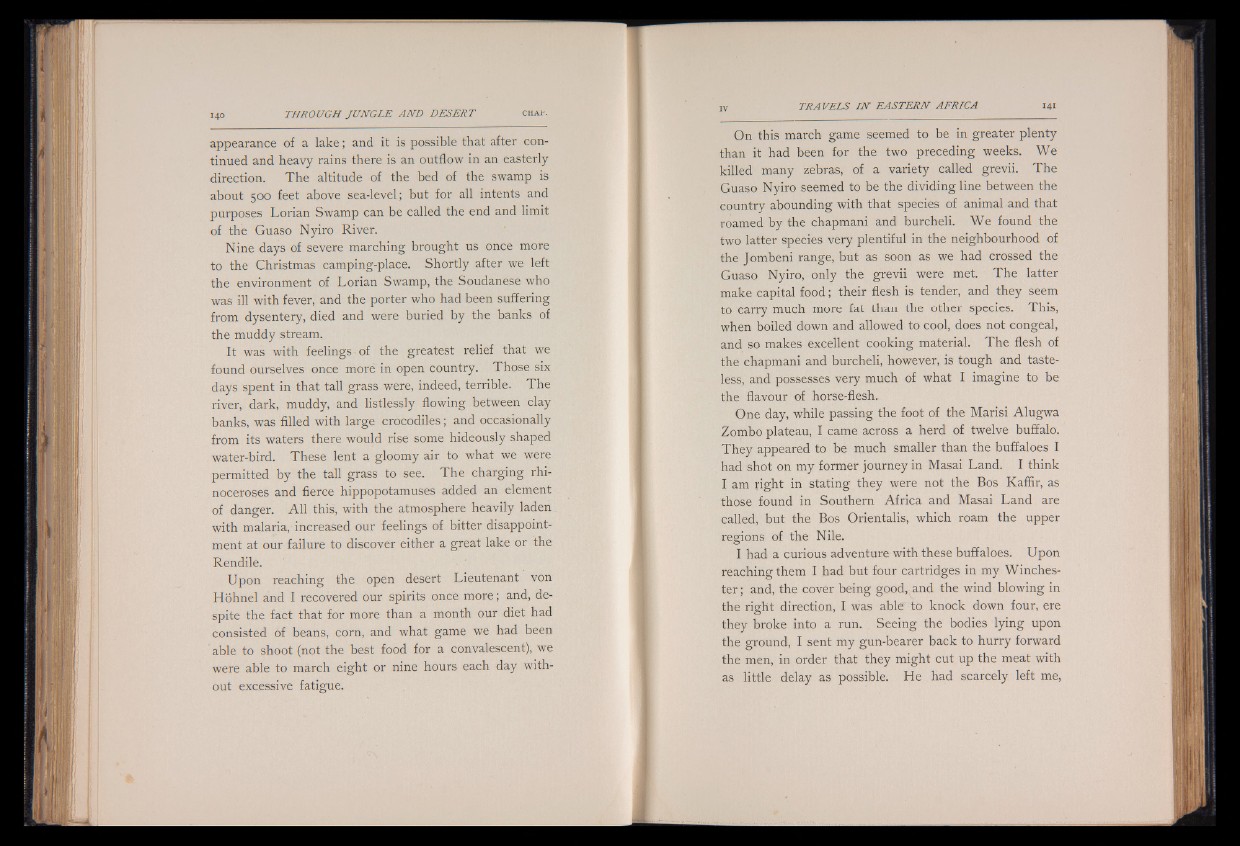
appearance of a lake; and it is possible that after continued
and heavy rains there is an outflow in an easterly
direction. The altitude of the bed of the swamp is
about 500 feet above sea-level; but for all intents and
purposes Lorian Swamp can be called the end and limit
of the Guaso Nyiro River.
Nine days of severe marching brought us once more
to the Christmas camping-place. Shortly after we left
the environment of Lorian Swamp, the Soudanese who
was ill with fever, and the porter who had been suffering
from dysentery, died and were buried by the banks of
the muddy stream.
It was with feelings of the greatest relief that we
found ourselves once more in open country. Those six
days spent in that tall grass were, indeed, terrible. The
river, dark, muddy, and listlessly flowing between clay
banks, was filled with large crocodiles; and occasionally
from its waters there would rise some hideously shaped
water-bird. These lent a gloomy air to what we were
permitted by the tall grass to see. The charging rhinoceroses
and fierce hippopotamuses added an element
of danger. All this, with the atmosphere heavily laden
with malaria, increased our feelings of bitter disappointment
at our failure to discover either a great lake or the
Rendile.
Upon reaching the open desert Lieutenant von
Hohnel and I recovered our spirits once more; and, despite
the fact that for more than a month our diet had
consisted of beans, corn, and what game we had been
able to shoot (not the best food for a convalescent), we
were able to march eight or nine hours each day without
excessive fatigue.
On this march game seemed to be in greater plenty
than it had been for the two preceding weeks. We
killed many zebras, of a variety called grevii. The
Guaso Nyiro seemed to be the dividing line between the
country abounding with that species of animal and that
roamed by the chapmani and burcheli. We found the
two latter species very plentiful in the neighbourhood of
the Jombeni range, but as soon as we had crossed the
Guaso Nyiro, only the grevii were met. The latter
make capital food; their flesh is tender, and they seem
to carry much more fat than the other species. This,
when boiled down and allowed to cool, does not congeal,
and so makes excellent cooking material. The flesh of
the chapmani and burcheli, however, is tough and tasteless,
and possesses very much of what I imagine to be
the flavour of horse-flesh.
One day, while passing the foot of the Marisi Alugwa
Zombo plateau, I came across a herd of twelve buffalo.
They appeared to be much smaller than the buffaloes I
had shot on my former journey in Masai Land. I think
I am right in stating they were not the Bos Kaffir, as
those found in Southern Africa and Masai Land are
called, but the Bos Orientalis, which roam the upper
regions of the Nile.
I had a curious adventure with these buffaloes. Upon
reaching them I had but four cartridges in my Winchester;
and, the cover being good, and the wind blowing in
the right direction, I was able to O ' knock down four, ere
they broke into a run. Seeing the bodies lying upon
the ground, I sent my gun-bearer back to hurry forward
the men, in order that they might cut up the meat with
as little delay as possible. He had scarcely left me,